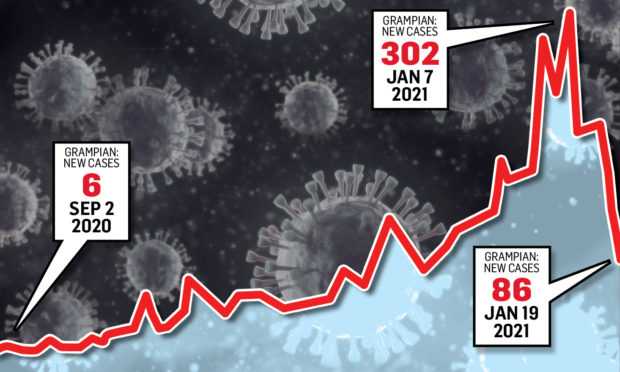The number of Covid-19 cases in Grampian is at the lowest level for almost a month, according to the latest figures.
Eighty-six new cases have been recorded in the area, marking the first time since December 29 that the region has had fewer than 100 cases.
Cases the north-east are also down more than 30%, from 1,320 in the seven days between January 3 and January 9, to 921 in the period between January 10 and January 16.
First Minister Nicola Sturgeon announced Scotland will remain in lockdown until the middle of February in her daily Scottish Government briefing yesterday.
Schools and nurseries will also continue to be closed until then except for vulnerable children and children of key workers.
The First Minister revealed that there was “cause for optimism” in the fact case numbers in the country were dropping but it was “vital” for everyone to stick with the current restrictions for a further period.
Ms Sturgeon said: “We believe that the lockdown restrictions – and the sacrifices everyone continues to make – are beginning to have an impact.
“Case numbers – which had been rising rapidly – appear to have stabilised and even declined.
“In the week to January 14, there was an average of around 1,900 confirmed new cases per day. This is an 18% reduction on the previous week.
“Test positivity has also declined slightly, as has the number of cases per 100,000 of the population.”
“It is for these reasons, the cabinet decided this morning to maintain the restrictions which are currently in place.
“That means that the lockdown restrictions – including the strict stay-at-home requirement – will remain in place across mainland Scotland and some island communities until at least the middle of February.”
The country is still in a “precarious” position, with numbers still too high for any restrictions to be relaxed, according to Ms Sturgeon.
In the weekly results, there were more than 200 positive cases per 100,000 people.
Aberdeen has an average rate per 100,000 population of 234.
A map showing the breakdown of cases by neighbourhood reveals these three neighbourhoods in Aberdeen are in the highest category, with a rate greater than 400 per 100,000 people.
According to the figures, 44 cases were detected in Danestone, 29 in Torry West, and 27 in Cults, Bieldside and Milltimber West.
A further 24 areas are in the second-highest band, including Froghall, George Street, Tillydrone, Hazlehead and Mastrick.
In Aberdeenshire, there have been 386 positive Covid-19 cases in the last seven-day period.
The test positivity rate for the region is 7.7%.
A map showing the breakdown of cases by neighbourhood reveals only one neighbourhood in Aberdeenshire is in the highest category.
Kemnay saw the highest number of cases per 100,000 population in the region, with 15 confirmed over the seven-day period in an area with a population of 3,471.
Newmachar and Fintray also saw 15 cases over the same period, while Cromar and Kildrummy had 12 positive cases.
Eleven areas are in the second-highest band, including Durno, Stonehaven south, Newmachar and Fintry and Minlaw.
In her briefing, the First Minister also confirmed that schools and nurseries in the country would remain shut until at least the middle of February.
The original date for reopening schools was February 1.
Community transmission of Covid remains high in Scotland, which has forced the Scottish Government to delay this.
https://www.eveningexpress.co.uk/fp/news/specials/coronavirus-in-scotland-track-the-spread-in-these-charts-and-maps3010/
Ms Sturgeon said: “The cabinet decided today that – except for vulnerable and key worker children – school and nursery premises will remain closed until mid-February.”
“If it is at all possible, as I very much hope it will be, to begin even a phased return to in-school learning in mid-February, we will.
“However, it is still too early to confirm a definitive return to school for children across Scotland.”
Ms Sturgeon said she was “grateful” to everyone across the country for their hard work and sacrifice and that “staying at home” is essential right now to suppress the virus.
The Scottish Government are looking at how best they can control the borders to stop the virus being flown back into the country.
Air travel corridors were scrapped on Monday, and they are looking at other ways to help with this.
She added: “The strong advice is that no one should be travelling unless essential.”
Eighty per cent of care home residents in Scotland have now received their first dose of the Covid vaccine.
https://www.eveningexpress.co.uk/fp/news/specials/covid-vaccine-in-scotland-track-the-rollout-progress-with-these-charts/
